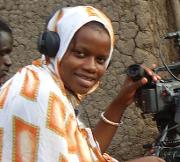“Death does not terminate the soul”, an analysis of the political, literary and ethnographic thought of Fily Dabo Sissoko (1900-1964), one of modern Mali’s founding fathers, and my maternal grandfather
by Bata Diallo

Fate has brought me to this subject in various ways. Actually, the original proposal for my PhD research was about activist youth groups (and other associative movements) in the city of Gao, in far northern Mali; associations that sprang up in adaptive response to the political upheavals and ensuing social chaos of recent years. I originally wrote in that proposal:
“Since 2012, these people have been subjected to various forms of change in their everyday lives, including deprivations of individual liberty, economic precariousness, cultural uprooting, that is, a falling down of life patterns built up through several generations ... faced with a collective feeling of abandonment from the State, the people of Gao, mostly the youth, initiated resistance actions, first through the establishment of associations, and then against the (former) occupiers through civic (protest marches) and even military (self-defence groups) actions. The resistance sought on the one hand, to recover dignity for themselves and, on the other, to secure their locality against acts of banditry, kidnappings and even murders.”
As things have turned out, though, I have been forced to put my research/fieldwork plans on hold. Two months after the beginning of my doctoral course, I found myself in a hospital bed for a chronic infection. Given the complex and cumbersome treatment regime I faced, it was no longer feasible for me return home to Mali to conduct my research. Nevertheless, from the beginning of this illness episode, I set myself the goal of not submitting to the dictates of the disease. I absolutely needed to find some survival strategies; not only limited to the requirements of the medical treatment, but also others to support my psychic health. I was determined to hold on to my identity as a doctoral student, and not change it for that of a ‘patient’. After all, the whole reason I came here, this time, was to devote myself to achieving my academic (ethnographic) goals. That's why I made the tough decision to be separated, for a time from my children, aged one and three. I am committed, more than ever, to living-up to this status of scholar abroad and mother too.
So I believe that with my new research topic on the life and thought of my late grandfather, Fily Dabo Sissoko, teacher-philosopher-politician and proud Malian, my problems will be alleviated in two ways. First, the ‘fieldwork’ can be largely library and internet based so I will be able to stay close to the hospital facilities I need now to keep my body going. And apart from the work on his books, most of the interviews I would want to do can be done close to home. (Very close, in some cases, since they’d be with my own family.) The second way I’ll be helped is in my mind. The spending of these coming months getting to know the spirit of my mother’s father (whom I never met) will, I’m sure, be a kind of healing process as I learn so much about who I am myself. And, as it turns out, the subject is enormously important for other reasons. He was, after all, not only a man of letters and a leader at the birth of the nation but also one of Mali’s first ethnographer (albeit self-taught) who, in the 1930s engaged in vigorous debate by correspondence with the leading anthropological thinkers of his day (for example, with Lucien Lévy-Bruhl about concepts in “How Natives Think”. He was also known to refute aspects of James George Frazer’s pioneering work on religion “The Golden Bough” 1890).